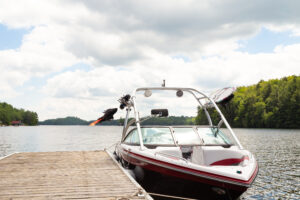Boating activities on Nevada’s breathtaking bodies of water, such as Lake Mead and Lake Tahoe, offer residents and tourists ample opportunities for recreation. However, the enjoyment of these natural wonders is sometimes ruined by accidents that result in physical harm and emotional distress.
Understanding the legal framework around boat accidents in Nevada is crucial for anyone who frequents these waterways.
What Should I Do After A Boating Accident?
Once you’ve received medical care, gather evidence to support your case. Photos of the accident site, eyewitness accounts, and medical records can be invaluable.

Additionally, the Nevada Department of Wildlife may produce an accident report, which can serve as an essential piece of evidence. It’s also advisable to consult with an experienced boat accident lawyer who can guide you through the legal process and help you build a strong case.
What Are the Laws Governing Boat Accidents in Nevada?
Boat accidents fall under maritime law, which governs activities on navigable waters. In Nevada, the primary law governing boat accidents is the Nevada Revised Statutes (NRS) Chapter 488, which outlines the responsibilities of boat operators and the rights of victims.
Under NRS Chapter 488, boat operators have a duty to operate their vessels in a safe and responsible manner. This includes following all applicable boating regulations, maintaining a proper lookout, and avoiding reckless behavior such as excessive speed or operating under the influence of alcohol or drugs.
If a boat operator breaches this duty and causes an accident, they may be held liable for any resulting injuries or damages.
What Are the Key Legal Principles Related to Boat Accidents in Nevada?
Negligence–Negligence is the cornerstone of most personal injury cases, and boat accident lawsuits in Nevada are no exception. For a successful lawsuit, it’s necessary to establish that the person at fault acted negligently. This may include reckless boat operation, failure to provide adequate safety gear, or piloting a boat while under the influence of substances.
Statute of Limitations–In Nevada, the timeline for filing a boat accident lawsuit is limited. The statute of limitations stipulates that you have two years from the date of the accident to initiate a claim. Missing this deadline could bar you from seeking legal redress.
Comparative Fault–Nevada adheres to the legal principle of comparative fault. This means that if you’re partially responsible for the accident, your compensation may be reduced proportionally to your level of fault.
Are There Any Specific Boating Concerns in Nevada?
Lake Mead–Lake Mead, formed by the Hoover Dam, is a popular boating destination. However, its rocky underwater terrain can be perilous for boaters. Make sure to adhere to all navigational rules and guidelines to minimize risks.
Lake Tahoe–Known for its stunning blue waters, Lake Tahoe straddles the Nevada-California border. Cross-state regulations can complicate legal issues, making it critical to consult a Nevada-based lawyer well-versed in multi-jurisdictional cases.
Colorado River–The Colorado River is one of the most iconic rivers that flows through Nevada, and it is a popular location for various water-based activities, including boating, kayaking, and fishing. The river is subject to both federal and state regulations. Accidents here can be particularly tricky to navigate legally due to its multi-state span, making it vital to consult a legal expert familiar with Nevada and federal maritime laws.
Truckee River–The Truckee River is another significant waterway in Nevada, connecting Lake Tahoe to Pyramid Lake. Given its strong currents and fluctuating water levels, boaters must exercise extra caution. The presence of watercraft like kayaks and paddleboards adds another layer of complexity to boat safety and, consequently, legal considerations surrounding accidents.
Virgin River–The Virgin River runs through the northeastern part of Nevada and is another hot spot for recreational boating. It poses its own unique risks due to its narrow and shallow channels. Boaters should be aware of these specific conditions and adhere strictly to safety guidelines to minimize the likelihood of an accident.
How Are Settlement Amounts Determined?
Medical Expenses–Victims of boat accidents often face staggering medical bills for treatments, surgeries, and long-term care. Legal redress can help cover these costs.
Emotional Distress–In addition to physical injuries, the emotional trauma stemming from a boat accident can be debilitating. You may be eligible for compensation that accounts for this emotional toll.
Property Damage–Accidents can cause extensive harm to personal property, such as boats and equipment. A successful lawsuit may award damages for the loss or repair of these items.
How Can an Experienced Lawyer Help?
An experienced boat accident lawyer will thoroughly investigate the accident, gather evidence, and build a strong case on your behalf. They will negotiate with insurance companies and the opposing party to ensure you receive fair compensation for your injuries and damages. Additionally, a lawyer can help you understand your rights, navigate the legal system, and advocate for your best interests every step of the way.
If you’ve been involved in a boat accident, call High Stakes Injury Law at (702) 605-6671 for a free case review.




